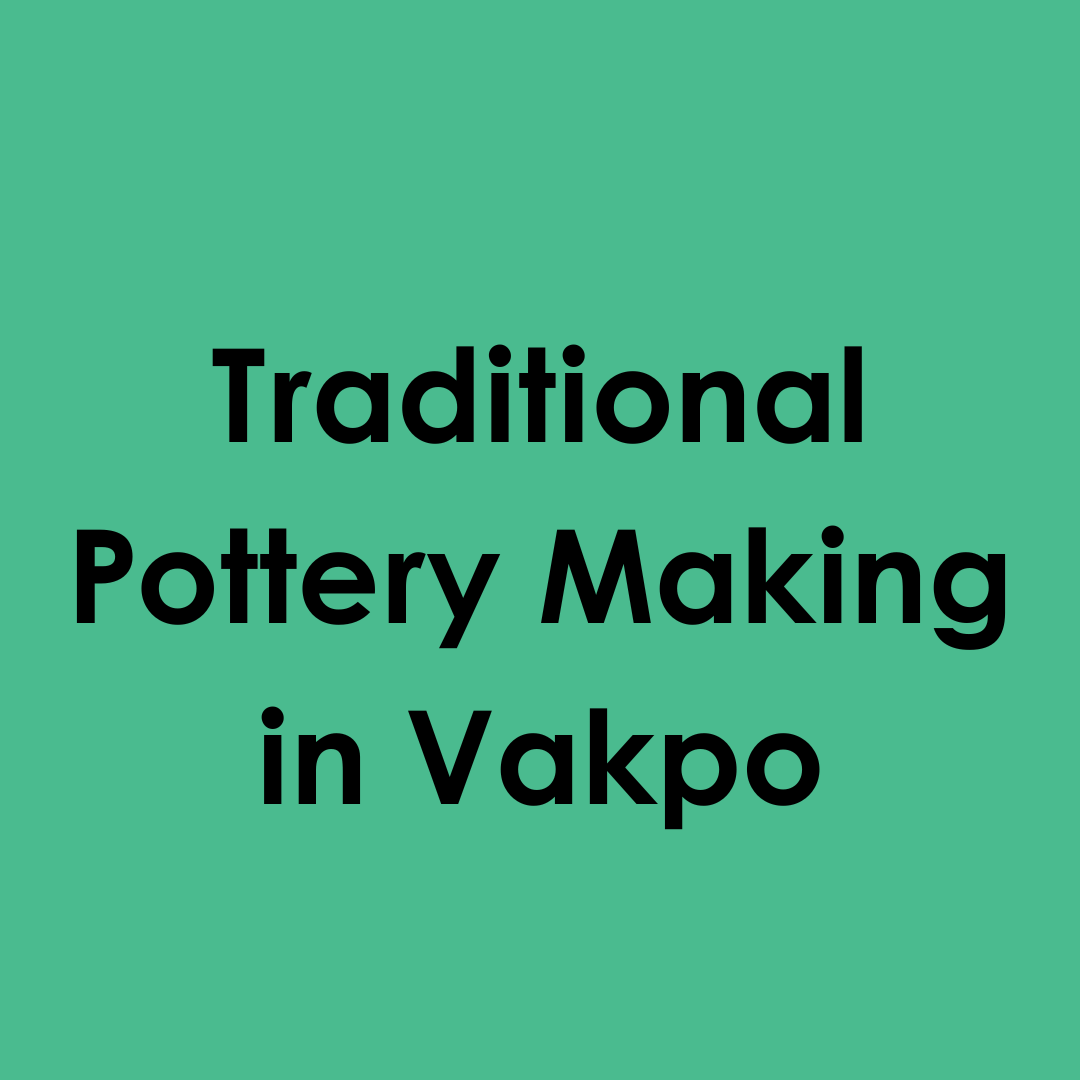In the heart of Ghana’s Volta Region lies the village of Vakpo, renowned for its rich tradition of pottery making. This centuries-old craft, deeply rooted in the local culture and history, continues to thrive in Vakpo, where artisans uphold age-old techniques and produce stunning pieces that are both functional and aesthetically pleasing. The art of traditional pottery in Vakpo is more than just a craft; it is a vibrant expression of the community’s heritage and creativity.
A Glimpse into Vakpo’s Pottery Tradition
Vakpo’s pottery tradition dates back to ancient times, and it is an integral part of the village’s cultural identity. Pottery in Vakpo is not only about creating utilitarian objects but also about preserving a rich cultural legacy. The craft involves a series of meticulous processes, from sourcing raw materials to shaping and firing the clay, each step reflecting the skill and artistry of the potter.
The primary material used in Vakpo’s pottery is local clay, which is known for its rich, earthy colors and excellent workability. The clay is carefully sourced from riverbanks and other natural deposits, ensuring that it possesses the right properties for shaping and firing. This deep connection to the land underscores the harmony between the artisans and their environment.
Crafting with Tradition
The process of making pottery in Vakpo is a blend of traditional techniques and artistic intuition. The artisans, often working in family groups or small workshops, follow a well-defined sequence of steps to create their pieces.
-
Preparation of Clay: The process begins with the preparation of clay. Artisans collect the raw clay and remove impurities by washing and sieving it. The clay is then kneaded to achieve the right consistency, ensuring that it is smooth and pliable for shaping.
-
Shaping: Once the clay is prepared, it is shaped into various forms using traditional techniques. Hand-building methods are predominant, with artisans employing coil and slab techniques to create their pottery. Each piece is crafted with care, often reflecting intricate designs and patterns that hold cultural significance.
-
Decorating: Decoration is a crucial aspect of Vakpo pottery. Artisans use a combination of incised patterns, geometric motifs, and natural pigments to adorn their creations. These designs often carry symbolic meanings and are passed down through generations, preserving the village’s rich artistic heritage.
-
Firing: After shaping and decorating, the pottery is dried and fired in traditional kilns. The firing process is carefully controlled to ensure that each piece achieves the desired color and strength. The kilns used in Vakpo are often simple, wood-fired structures, which impart a distinctive texture and finish to the pottery.
Cultural Significance
Vakpo’s pottery is more than just an art form; it is deeply intertwined with the village’s cultural practices and daily life. Traditional pots are used for a variety of purposes, including cooking, storage, and ceremonial functions. The craftsmanship reflects the community’s values and beliefs, with each piece serving as a vessel for both practical and symbolic purposes.
The designs and motifs used in Vakpo pottery often tell stories of the community’s history, mythology, and daily life. For instance, certain patterns may symbolize fertility, prosperity, or ancestral reverence. This rich symbolism adds a layer of depth to the pottery, making each piece a meaningful artifact of the village’s cultural heritage.
Preservation and Innovation
In recent years, there has been a growing interest in preserving and promoting traditional pottery in Vakpo. Efforts are being made to ensure that the craft continues to thrive amidst modern challenges. Local artisans are working to preserve traditional techniques while also exploring innovative approaches to attract new audiences and markets.
Workshops and training programs are being organized to pass on the skills and knowledge to younger generations. These initiatives help maintain the craft’s relevance and ensure that it remains a vibrant part of Vakpo’s cultural landscape. Additionally, collaborations with local and international artisans and designers have opened new avenues for showcasing Vakpo’s pottery, further enhancing its visibility and appreciation.
Experiencing Vakpo’s Pottery
For visitors to Vakpo, the opportunity to experience traditional pottery making is both enriching and enlightening. Local artisans often offer workshops and demonstrations, providing a hands-on experience of the craft. These sessions allow visitors to learn about the pottery-making process, try their hand at shaping clay, and gain insight into the cultural significance of the designs.
Moreover, visitors can explore local markets and craft fairs where Vakpo pottery is showcased. These markets provide a chance to purchase unique, handcrafted pieces while supporting the local economy. Each piece of pottery serves as a tangible reminder of Vakpo’s rich artistic heritage and the skill of its artisans.
A Craft with a Future
The tradition of pottery making in Vakpo is a testament to the enduring creativity and cultural richness of the community. As artisans continue to uphold and innovate upon traditional techniques, Vakpo’s pottery remains a vibrant expression of Ghanaian heritage. The craft not only provides beautiful and functional objects but also serves as a living link to the past, embodying the values, beliefs, and artistic vision of the village.
In a world where many traditional crafts face the threat of disappearing, Vakpo’s pottery stands as a shining example of resilience and cultural pride. Through ongoing efforts to preserve and promote this ancient art form, the village of Vakpo ensures that its pottery tradition will continue to thrive for generations to come.
Grassroot Tours: Explore Vakpo’s Pottery Tradition
Grassroot Tours invites travelers to delve into the rich tradition of pottery making in Vakpo with their exclusive cultural tours. These experiences offer a unique opportunity to witness and participate in one of Ghana’s most cherished artisanal crafts.
Tour participants can engage directly with skilled local potters, observing traditional techniques passed down through generations. Grassroot Tours provides guided visits to pottery workshops, where visitors can see the entire process—from clay preparation and shaping to decorating and firing. Hands-on workshops allow guests to try their hand at pottery making, guided by expert artisans who share their knowledge and passion for the craft.
In addition to the immersive pottery experiences, Grassroot Tours highlights the cultural significance of Vakpo’s pottery. Visitors learn about the symbolic motifs and designs that reflect the village’s history and traditions. The tours also include opportunities to purchase authentic, handcrafted pottery directly from the artisans, supporting local craftsmanship and contributing to the preservation of this important cultural heritage.
With a focus on sustainable and responsible tourism, Grassroot Tours ensures that visitors experience Vakpo’s pottery tradition in a way that benefits both the community and the environment.


